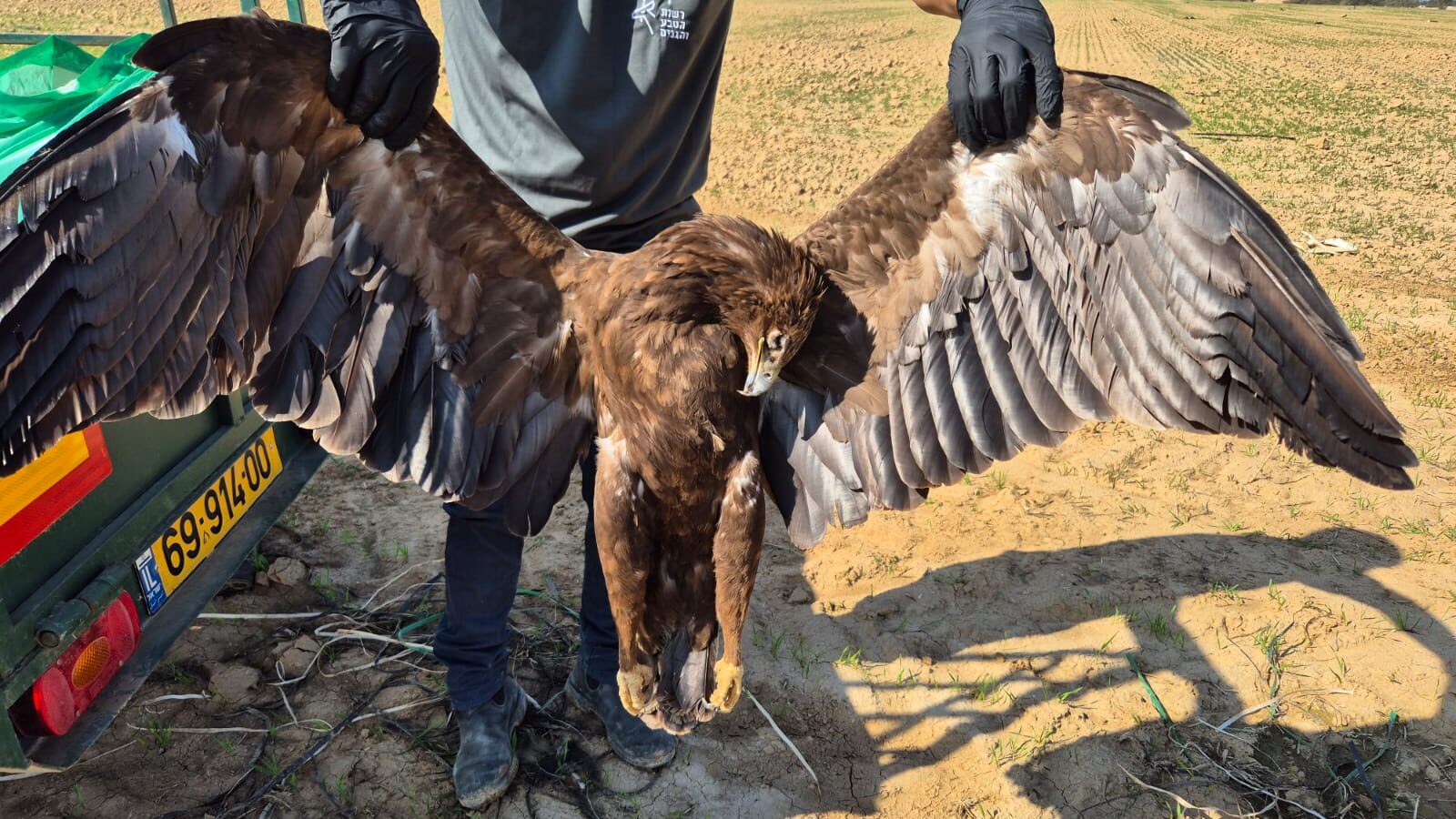Death Toll Rises to 1,000: Mass Bird Poisoning in Israel Sparks Urgent Calls for Reform
Authorities confirm that pesticide poisoning caused the deaths of nearly 1,000 birds in southern Israel, a dramatic increase from initial estimates. Experts warn of severe ecological consequences and call for stricter pesticide regulations.
A mass poisoning event in southern Israel has killed nearly 1,000 birds, according to the Israel Nature and Parks Authority (INPA). The die-off, initially estimated at 335, includes protected species such as greater spotted eagles, black kites, spur-winged lapwings, and hooded crows. The birds were discovered near the village of Patish in the Western Negev, prompting an urgent investigation into the cause of the poisoning and its potential link to agricultural pesticide use.
As the scale of the deaths became clear, representatives from the Ministry of Agriculture and Food Security joined INPA inspectors at the site to collect crop, soil, and water samples. “They inspected the surrounding agricultural areas and collected samples to determine whether pesticides were responsible for the contamination,” the ministry stated.
The affected birds were transferred to the ministry’s veterinary institute for postmortem analysis. INPA has launched an official investigation into the circumstances surrounding the incident.
“Right now, I just picked up another 150 birds with the ranger, so I can assume that this poisoning is pretty much in the hundreds, close to 1,000,” INPA’s chief veterinarian, Tomer Nissimyan, shared with The Media Line while working in the field.
The majority of the affected birds are black kites, migratory raptors that travel from Ukraine, Belarus, and other parts of Europe to spend the winter in Israel, often gathering near dump sites. However, other bird species have also been found among the casualties.
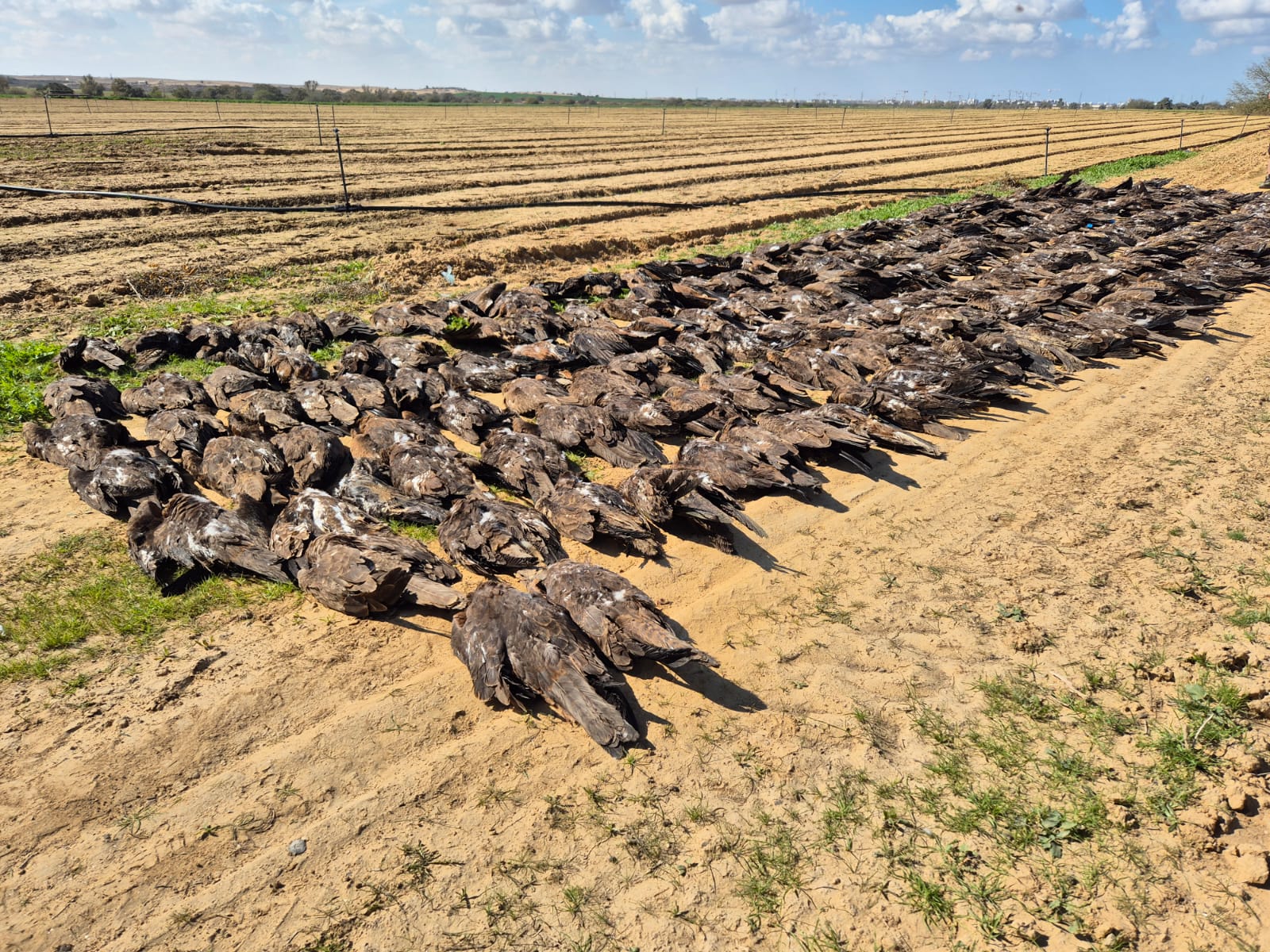
(Israel Nature and Parks Authority)
Poisoning Confirmed as the Cause of Death
Tomer Nissimyan has confirmed that the mass death of nearly 1,000 black kites in southern Israel was caused by pesticide poisoning. Initial estimates placed the death toll at 335, but as more birds were discovered, the number has surged. After extensive testing, laboratory results have confirmed that the birds were poisoned by Fenamiphos, an organophosphate pesticide commonly used in agriculture.
We actually now have proof—it proved to be a poison: Fenamiphos. It is legal, but its method of use needs to be examined.
“We actually now have proof—it proved to be a poison: Fenamiphos. It is legal, but its method of use needs to be examined,” Nissimyan said. “Maybe the farmer didn’t follow the label instructions, or maybe the label itself is too loose, meaning we need to change it or even ban the poison altogether,” Nissimyan said.
A Fast and Painful Death
Nissimyan described the unprecedented scale of this mass poisoning event.
“We have seen a few situations similar to this, with dozens of birds dying, but not as many as this,” he said.
The sheer number of dead birds scattered across the landscape was overwhelming.
“It’s not the best sight,” he admitted. “As a veterinarian at the Israel Nature and Parks Authority, my job includes the good, the bad, and the ugly. The good is saving animals and reintroducing them to the wild. The bad is dealing with diseases and poisoning. And the ugly—well, sometimes, it’s witnessing something like this.”
Despite the grim nature of the discovery, Nissimyan stressed the importance of educating the public about the dangers of pesticide misuse.
“It’s not just about the black kites that died. This also concerns our health and our environment. And I see it as a privilege to do this work, even when it’s hard,” he said.
When asked whether the birds suffered, Nissimyan confirmed that the poisoning was both rapid and excruciating.
“It looks like a really fast and painful death, and we should make sure that these things won’t happen again,” he said.
Israeli authorities have now scheduled a high-level meeting in two weeks with the Ministry of Agriculture and the Ministry of Environmental Protection to discuss pesticide regulation and potential restrictions on certain chemicals.
“One of the things we will discuss is how to regulate poisons more effectively,” Nissimyan explained. “For example, Nemacor is an organophosphate, and we have seen a few cases of its misuse. When people abuse poisons—because they don’t apply them correctly or don’t know how to use them—it’s something that requires immediate regulatory change.”
This holiday season, give to:
Truth and understanding
The Media Line's intrepid correspondents are in Israel, Gaza, Lebanon, Syria and Pakistan providing first-person reporting.
They all said they cover it.
We see it.
We report with just one agenda: the truth.


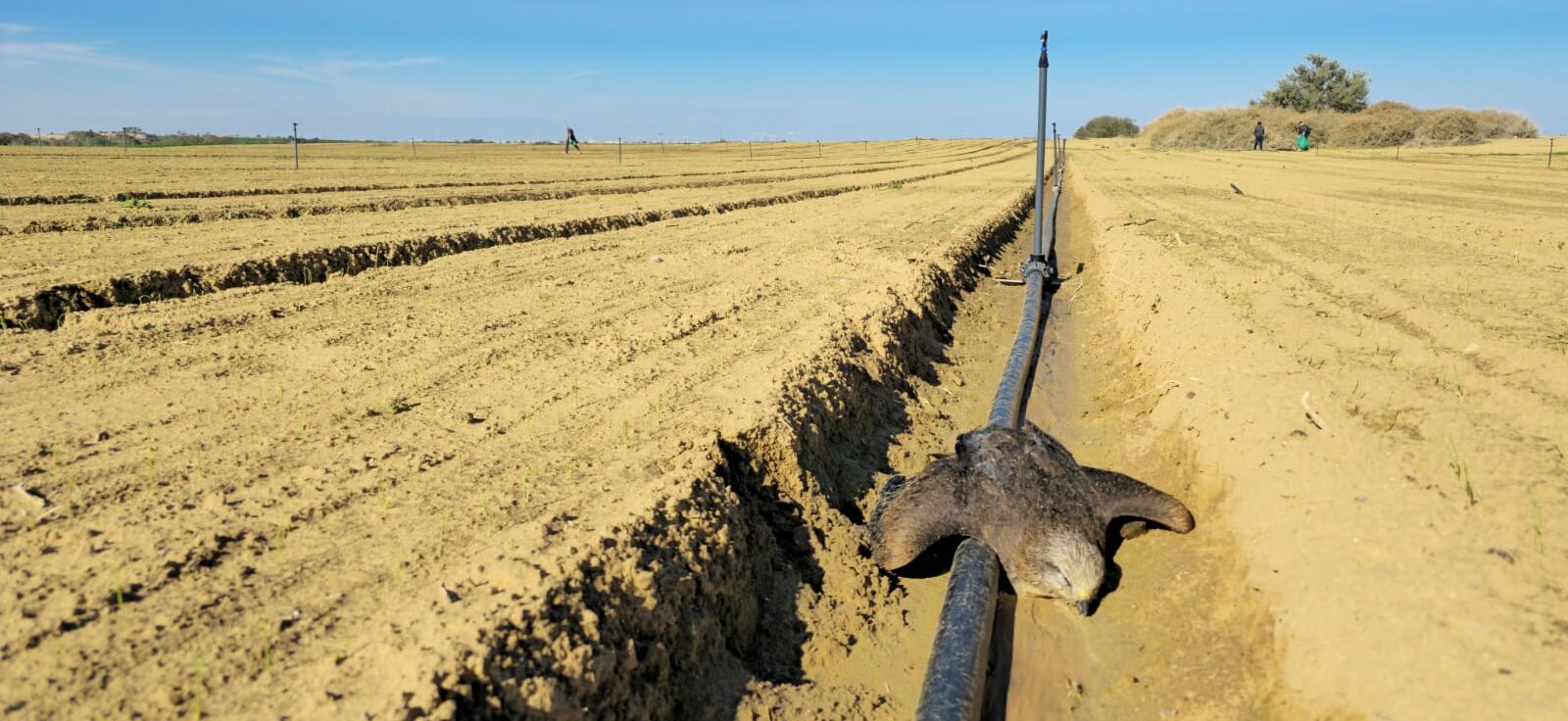
(Israel Nature and Parks Authority)
The Role of Black Kites in the Ecosystem
Dr. Motti Charter, senior researcher at the Shamir Research Institute and lecturer at the University of Haifa’s Department of Geography and Environmental Studies, explained the critical role these birds play in nature, the dangers of pesticide misuse, and why such poisonings are far more common than we realize.
Charter stressed that birds of prey are essential to maintaining ecosystem stability, particularly by regulating prey populations.
“Most birds of prey are predators, which means they help control prey populations. When predators are absent, prey populations can increase drastically and become pests. So predators have a huge role in ecology,” he explained.
However, black kites are unique among birds of prey because they are scavengers rather than active hunters.
“Even though they’re birds of prey, they mainly scavenge. That means they feed on carcasses, garbage, or anything else they can find,” Charter said. “Black kites are like nature’s sanitizers—they clean up the environment, which makes them incredibly important.”
Without scavengers, disease transmission increases, as decaying animal carcasses remain in the environment longer.
If you leave carcasses out, diseases can spread. Black kites and other scavengers act like nature’s sanitation workers.
“If you leave carcasses out, diseases can spread. Black kites and other scavengers act like nature’s sanitation workers,” he explained. “If people don’t understand why they’re important, just imagine a city without garbage collectors. You might not think about them every day, but if they disappear, you’ll quickly see how essential they are. The same goes for scavengers in nature.”
Changes in veterinary regulations have also impacted scavenger birds. Farmers are now required to collect and properly dispose of livestock carcasses, meaning there are fewer natural food sources available.
“In the past, carcasses from agriculture were left in the fields. Now, regulations require that they be removed, which means scavengers must rely more on human waste sites, garbage dumps, or improperly disposed animal remains,” Charter said.
The Hidden Threat of Pesticide Poisoning
While mass poisoning events like this are highly visible, Charter emphasized that many more poison-related deaths go undetected.
“Most of the time, we only detect poisonings when they are massive, like what happened with the black kites,” he explained.
Many poisoned animals die far from the contamination site, meaning their deaths go unnoticed.
“When poison doesn’t act immediately, birds might continue flying for a week or more before they die. In those cases, they die in different places, and we don’t see a mass die-off in one location,” Charter said. “That means we only detect a small fraction of the total poisonings that actually happen.”
Because testing for pesticide contamination is expensive, the true scale of pesticide-related wildlife deaths remains largely unknown.
“To really understand how pesticides affect us and the environment, we would need to constantly test animals—and that’s extremely costly,” he explained.
Most mass poisonings occur due to either deliberate targeting of animals or major accidents, such as improper pesticide use.
“Mass poisonings typically happen for two reasons—either someone intended to poison something and other animals were affected, or someone made a major mistake by misapplying or spilling poison,” he said.
The scale of this particular poisoning event, he noted, makes it an extreme case.
“These kinds of events shouldn’t happen. They are dramatic because we see the immediate impact, with hundreds of dead birds in one place,” he said.
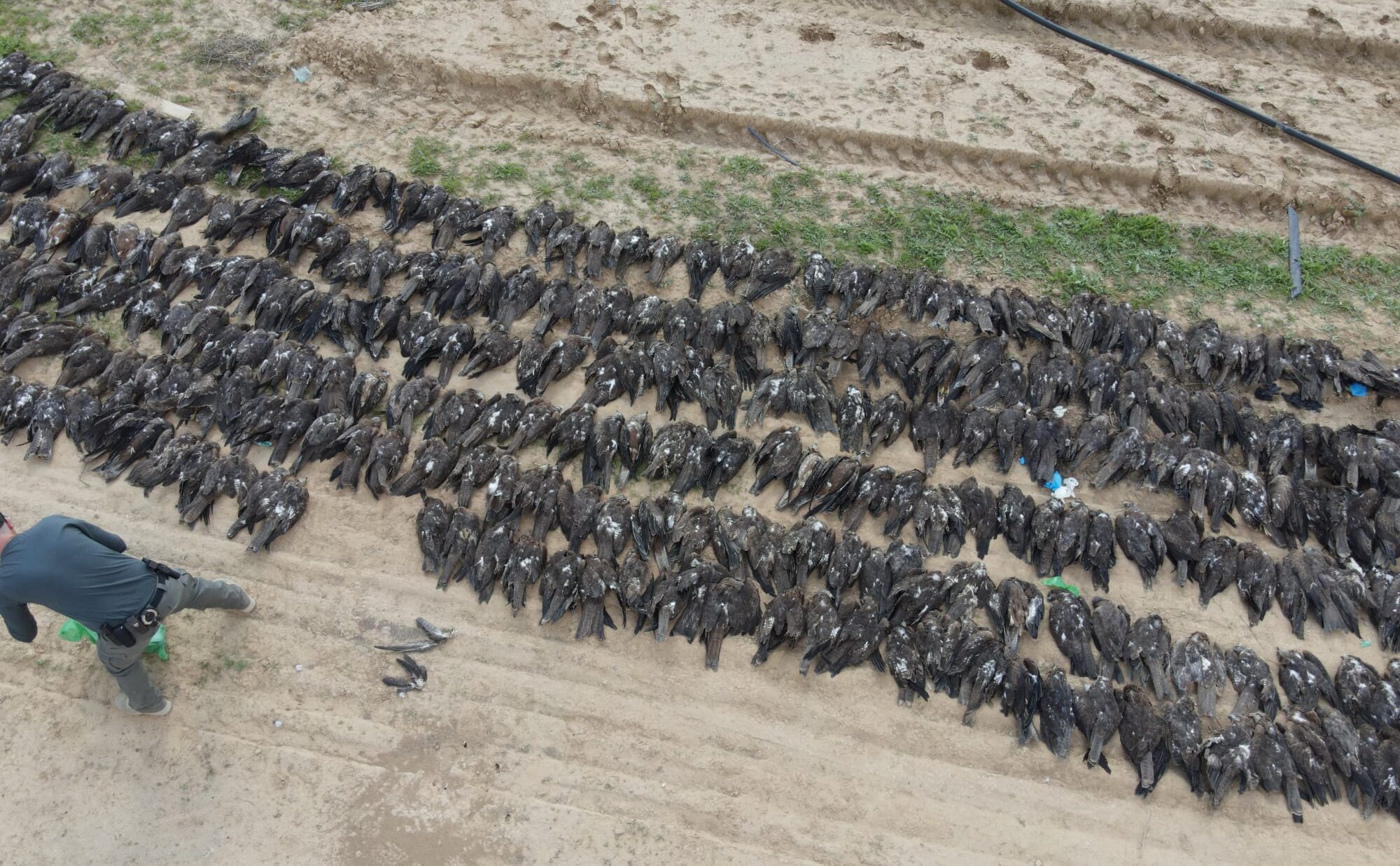
(Israel Nature and Parks Authority)
‘These Birds Are Essential to the Environment’
Charter stressed that all wildlife has an important role, and the loss of scavengers like black kites and birds of prey could have lasting consequences.
“These birds are essential,” he stated. “If we don’t have scavengers cleaning up carcasses, diseases can spread more easily. They are part of nature’s cleaning crew.”
He urged authorities to take stronger action to prevent future poisonings.
This event is a disaster, and we need to learn from it. We need better pesticide regulations, more enforcement, and a greater understanding of how poison use affects not just wildlife, but the entire ecosystem.
“This event is a disaster, and we need to learn from it. We need better pesticide regulations, more enforcement, and a greater understanding of how poison use affects not just wildlife, but the entire ecosystem,” he concluded.
Call for Stricter Pesticide Regulations
Following this environmental disaster, Nissimyan stressed the urgent need for stricter pesticide regulations in Israel. “Even though we now know for sure it’s poisoning, this event highlights the great importance of tighter regulation of poisons in Israel, especially agricultural poisons,” he emphasized.
Nissimyan acknowledged that completely banning pesticides without providing alternatives could create new challenges for farmers. “We have to give farmers solutions to their problems,” he noted. “If you take away all their ability to protect their crops, they might use pesticides illegally or ignore the regulations altogether. So we need to provide them with safer alternatives while also improving enforcement against improper use.”
He stressed the importance of monitoring pesticide sales to ensure that only authorized individuals can purchase and apply them.
“We need to have good regulation so that when someone misuses pesticides, we know who they are and we can monitor the sales of these substances,” Nissimyan stated.
The ultimate goal, according to Nissimyan, is to strike a balance—protecting crops without endangering wildlife.
“If we don’t address this issue now, it will happen again. We need to act fast. This is not just about birds—it’s about protecting our environment and preventing future disasters like this from happening again,” he concluded.
Authorities are also taking steps to prevent similar incidents in the future. According to the ministry, “The Ministry of Agriculture and Food Security is promoting cooperation with the Israel Nature and Parks Authority, with one of the key issues being the prevention of wildlife poisoning.”
Additionally, efforts are being made to regulate the sale and use of agricultural pesticides to prevent unauthorized access. “The ministry is advancing regulations to ensure that agricultural pesticides are sold exclusively to authorized individuals, preventing unauthorized use. The ministry also conducts training courses to promote the proper use of pesticides,” the statement noted.
The Ministry of Agriculture and Food Security has also been working on long-term measures to reduce pesticide use in Israel. “For several years, the ministry has been conducting a review aimed at reducing pesticide use. As part of this effort, over 200 pesticide products have already been removed from the market,” the statement explained. The ministry reaffirmed its commitment to minimizing pesticide use and strengthening oversight on sales.
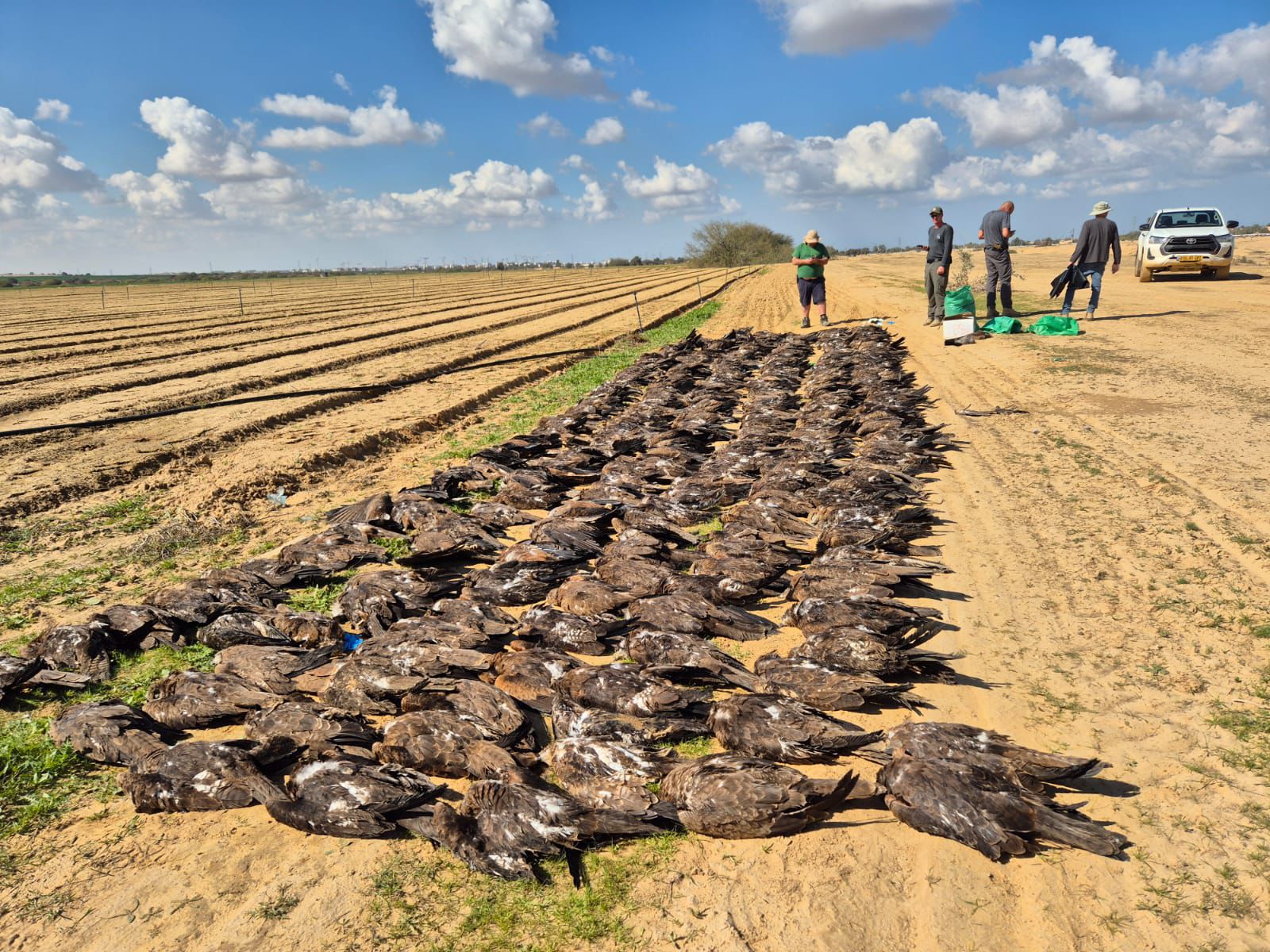
(Israel Nature and Parks Authority)
